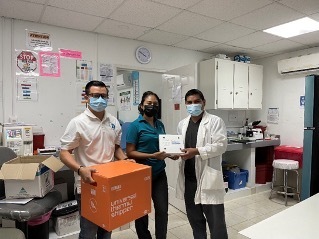Belize Response Initiative for Cold Chain Development
Effective Health Service Delivery Around the Globe
Keeping biological samples, medications, testing supplies, and vaccines at temperatures that do not exceed manufacturer requirements is crucial for public health. Yet this process has proven complex in many low- and middle-income countries.
Recognizing the need to revamp these systems, known as the cold chain, the Pulte Institute, in conjunction with faculty from Notre Dame's Eck Institute for Global Health, helped to forge partnerships, resulting in a new solution in Belize that can be scaled to other countries. The goal was to monitor the existing biological sample transfer from regional laboratories to the country’s national reference laboratory and offer solutions to ensure samples remained at the proper temperature throughout the journey.

The project evaluated current procedures used to deliver specimens and designed a pilot implementation strategy to address areas of improvement within the country's existing cold-chain protocol. “It provided tangible evidence that the current system for sample referral from hospitals to the Central Medical Laboratory does not meet acceptable quality standards and must be improved,” Belize Ministry of Health and Wellness Senior Medical Technologist Aldo Sosa said.
For many diagnostic tests, including for COVID-19, if the sample is not maintained at a specific temperature, then the pathogen trying to be tested may degrade.
“The solution was developed in collaboration with the Belize Ministry of Health and Wellness and validated in the field to ensure it works effectively,” Associate Director of Operations and Finance Kevin Fink said. “A high-quality cold chain allows health workers to deliver life-saving vaccines and other important medicines to remote and sometimes marginalized communities.”
The team is now helping to deliver samples from rural community clinics that offer prenatal care. Obstetric panels are used to identify health problems in pregnancy, looking for diseases and infections that can affect the health of a woman and her unborn baby. The results guide treatments to improve the quality of life for patients and their families.